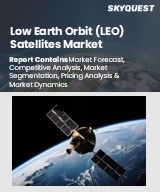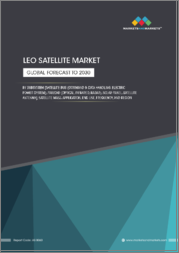
|
시장보고서
상품코드
1638741
LEO(저궤도) 위성 IoT 시장 전망 : 기회, 성장 촉진요인, 산업 동향 분석 및 예측(2024-2032년)Low Earth Orbit (LEO) Satellite IoT Market Opportunity, Growth Drivers, Industry Trend Analysis, and Forecast 2024 - 2032 |
||||||
세계의 LEO(저궤도) 위성 IoT 시장은 2023년 8억 4,960만 달러에 이르렀으며, 2024년부터 2032년까지 22.1% 이상의 높은 연평균 성장율(CAGR)로 확대될 것으로 예측됩니다.
이 시장은 기술 발전과 원활한 글로벌 연결에 대한 필요성 증가에 힘입어 빠르게 성장하고 있습니다.
LEO 위성 IoT는 흥미로운 전망을 제시하지만, 동시에 고유한 과제를 안고 있습니다. 위성 기술의 혁신 덕분에 외딴 지역에서 안정적이고 지연 시간이 짧은 IoT 연결에 대한 수요가 증가하면서 농업, 해양, 운송과 같은 산업 전반에서 도입이 촉진되었습니다. 그러나 위성 네트워크를 발사하고 유지하는 데 드는 높은 비용은 소규모 업체에게는 장벽이 될 수 있으며, 지역마다 다른 복잡한 규제 요건으로 인해 글로벌 배포 노력이 더욱 복잡해집니다.
서비스 유형별로 세분화된 LEO 위성 IoT 시장에는 위성 IoT 백홀과 위성 직접 연결 옵션이 포함됩니다. 2023년에는 위성 직접 연결 서비스가 55% 이상의 점유율로 가장 큰 시장 점유율을 차지할 것으로 예상됩니다. 이러한 서비스를 사용하면 지상 기반 인프라 없이도 디바이스를 위성에 직접 연결할 수 있어 외딴 지역과 통신이 취약한 지역의 연결성을 향상시킬 수 있습니다. 이 기술은 응급 서비스, 원격 근무 및 IoT를 위한 안정적인 통신을 가능하게 합니다.
| 시장 범위 | |
|---|---|
| 시작연도 | 2023년 |
| 예측연도 | 2024-2032년 |
| 시작 시장가치 | 8억 4,960만 달러 |
| 예측 시장가치 | 47억 9,000만 달러 |
| 연평균 성장율(CAGR) | 22.1% |
주파수 대역별로는 L대역, Ku대역, Ka대역, S 대역 등이 있습니다. Ku 및 Ka대역 부문은 예측 기간 동안 23% 이상의 CAGR을 나타낼 것으로 예상됩니다. Ku대역은 광대역 및 위성 TV에서 자주 사용되는 넓은 범위와 다양한 기상 조건 하에서 안정적인 성능을 제공합니다. 한편, Ka대역은 데이터 속도가 높고 대역폭이 넓기 때문에 고속 인터넷이나 고급 IoT 용도에 최적화되어 있지만 날씨에 의한 간섭의 영향을 받기 쉽습니다.
북미 지역은 2023년에 36% 이상의 점유율을 차지하며 LEO 위성 IoT 시장을 주도했으며, 2032년까지 선두 자리를 유지할 것으로 예상됩니다. 이 지역의 성장은 강력한 기술 발전과 글로벌 연결에 대한 높은 수요에 의해 뒷받침되고 있습니다. 기업들은 광범위한 위성 별자리를 적극적으로 개발하고 있으며, 다른 기업들은 위성 기능을 강화하여 정밀 농업에서 비상 대응에 이르는 다양한 용도를 지원하고 있습니다. 우호적인 규제 프레임워크와 우주 인프라에 대한 상당한 투자는 위성 기반 IoT 솔루션을 발전시키는 데 있어 북미의 영향력을 공고히 하고 있습니다.
목차
제1장 조사 방법과 조사 범위
제2장 주요 요약
제3장 업계 인사이트
- 생태계 분석
- 밸류체인에 영향을 주는 요인
- 이익률 분석
- 혼란
- 장래의 전망
- 제조업체
- 유통업체
- 공급자의 상황
- 이익률 분석
- 주요 뉴스
- 규제 상황
- 영향요인
- 성장 촉진요인
- LEO 위성을 통한 글로벌 연결 가속화
- LEO 위성 기술의 혁신
- 확대되는 IoT 생태계와 LEO 위성에 미치는 영향
- LEO 위성의 성장을 가속하는 전략적 제휴와 투자
- 경제, 환경 모니터링 수요 증가
- 업계의 잠재적 위험 및 과제
- LEO 위성 네트워크의 상당한 구축 비용
- LEO 위성에 의한 공간 파편과 궤도 혼잡의 과제
- 성장 촉진요인
- 성장 가능성 분석
- Porter's Five Forces 분석
- PESTEL 분석
제4장 경쟁 구도
- 소개
- 기업 점유율 분석
- 경쟁 포지셔닝 매트릭스
- 전략 전망 매트릭스
제5장 시장 추계 및 예측 : 서비스 유형별(2021-2032년)
- 주요 동향
- 위성 IoT 백홀
- 위성 간 직접 통신
제6장 시장 추계 및 예측 : 주파수대별(2021-2032년)
- 주요 동향
- L대역
- Ku및 Ka대역
- S대역
- 기타
제7장 시장 규모 추계 및 예측 : 조직규모별(2021-2032년)
- 주요 동향
- 대기업
- 중소기업
제8장 시장 추계 및 예측 : 최종 용도별(2021-2032년)
- 주요 동향
- 해운
- 석유 및 가스
- 에너지, 유틸리티
- 운송 및 물류
- 의료
- 농업
- 군 및 방위
- 기타
제9장 시장 추계 및 예측 : 지역별(2021-2032년)
- 주요 동향
- 북미
- 미국
- 캐나다
- 유럽
- 영국
- 독일
- 프랑스
- 이탈리아
- 스페인
- 러시아
- 아시아태평양
- 중국
- 인도
- 일본
- 한국
- 호주
- 라틴아메리카
- 브라질
- 멕시코
- 중동 및 아프리카
- 남아프리카
- 사우디아라비아
- 아랍에미리트(UAE)
제10장 기업 프로파일
- AAC Clyde Space
- Airbus
- BAE Systems
- Blue Origin
- China Aerospace Science and Technology Corporation
- Exolaunch
- GomSpace
- Lockheed Martin
- Maxar Technologies
- Millennium Space Systems
- Mitsubishi Electric
- Northrop Grumman
- OHB
- OneWeb
- RTX
- Sierra Nevada
- SpaceX
- Thales Alenia Space
The Global Low Earth Orbit (LEO) Satellite IoT Market reached USD 849.6 million in 2023 and is projected to expand at a robust CAGR of over 22.1% from 2024 to 2032. This market is experiencing rapid growth, driven by technological advancements and a rising need for seamless global connectivity.
While LEO satellite IoT presents exciting prospects, it also brings unique challenges. Demand for reliable, low-latency IoT connectivity in remote areas has spurred adoption across industries like agriculture, maritime, and transportation, thanks to innovations in satellite technology. However, the high costs associated with launching and maintaining satellite networks can be a barrier for smaller players, and complex regulatory requirements across different regions further complicate global deployment efforts.
Segmented by service type, the LEO satellite IoT market includes satellite IoT backhaul and direct-to-satellite options. In 2023, direct-to-satellite services held the largest market share at over 55%. These services allow devices to connect directly to satellites without requiring ground-based infrastructure, which enhances connectivity in remote and underserved areas. This technology enables dependable communication for emergency services, remote work, and IoT applications.
| Market Scope | |
|---|---|
| Start Year | 2023 |
| Forecast Year | 2024-2032 |
| Start Value | $849.6 Million |
| Forecast Value | $4.79 Billion |
| CAGR | 22.1% |
In terms of frequency band, the market includes L-band, Ku- and Ka-band, S-band, and others. The Ku- and Ka-band segment is anticipated to register a CAGR of over 23% during the forecast period. Known for its distinct advantages, the Ku-band offers broader coverage and dependable performance in diverse weather conditions commonly utilized in broadband and satellite TV. Meanwhile, the Ka-band, with higher data rates and greater bandwidth, is optimized for high-speed internet and advanced IoT applications, although it is more sensitive to weather interference.
North America led the LEO satellite IoT market in 2023, capturing over 36% of the share, and is expected to maintain its leading position through 2032. The region's growth is underpinned by strong technological progress and a high demand for global connectivity. Companies are actively developing extensive satellite constellations, while others are enhancing satellite capabilities, supporting applications ranging from precision agriculture to emergency response. Favorable regulatory frameworks and substantial investments in space infrastructure solidify North America's influence in advancing satellite-based IoT solutions.
Table of Contents
Chapter 1 Methodology & Scope
- 1.1 Market scope & definitions
- 1.2 Base estimates & calculations
- 1.3 Forecast calculations
- 1.4 Data sources
- 1.4.1 Primary
- 1.4.2 Secondary
- 1.4.2.1 Paid sources
- 1.4.2.2 Public sources
Chapter 2 Executive Summary
- 2.1 Industry synopsis, 2021-2032
Chapter 3 Industry Insights
- 3.1 Industry ecosystem analysis
- 3.1.1 Factor affecting the value chain
- 3.1.2 Profit margin analysis
- 3.1.3 Disruptions
- 3.1.4 Future outlook
- 3.1.5 Manufacturers
- 3.1.6 Distributors
- 3.2 Supplier landscape
- 3.3 Profit margin analysis
- 3.4 Key news & initiatives
- 3.5 Regulatory landscape
- 3.6 Impact forces
- 3.6.1 Growth drivers
- 3.6.1.1 Accelerating global connectivity through LEO satellites
- 3.6.1.2 Innovative breakthroughs in LEO satellite technology
- 3.6.1.3 Expanding IoT ecosystem and its impact on LEO satellites
- 3.6.1.4 Strategic collaborations and investments driving LEO satellite growth
- 3.6.1.5 Increasing demand for economic and environmental monitoring
- 3.6.2 Industry pitfalls & challenges
- 3.6.2.1 Substantial deployment costs for LEO satellite networks
- 3.6.2.2 Challenges of space debris and orbital congestion through LEO satellites
- 3.6.1 Growth drivers
- 3.7 Growth potential analysis
- 3.8 Porter's analysis
- 3.9 PESTEL analysis
Chapter 4 Competitive Landscape, 2023
- 4.1 Introduction
- 4.2 Company market share analysis
- 4.3 Competitive positioning matrix
- 4.4 Strategic outlook matrix
Chapter 5 Market Estimates & Forecast, By Service Type, 2021-2032 (USD Million)
- 5.1 Key trends
- 5.2 Satellite IoT backhaul
- 5.3 Direct-to-Satellite
Chapter 6 Market Estimates & Forecast, By Frequency Band, 2021-2032 (USD Million)
- 6.1 Key trends
- 6.2 L-band
- 6.3 Ku-and Ka-band
- 6.4 S-band
- 6.5 Others
Chapter 7 Market Estimates & Forecast, By Organization Size, 2021-2032 (USD Million)
- 7.1 Key trends
- 7.2 Large enterprises
- 7.3 SME
Chapter 8 Market Estimates & Forecast, By End Use, 2021-2032 (USD Million)
- 8.1 Key trends
- 8.2 Maritime
- 8.3 Oil & gas
- 8.4 Energy & utilities
- 8.5 Transportation & logistics
- 8.6 Healthcare
- 8.7 Agriculture
- 8.8 Military & defense
- 8.9 Others
Chapter 9 Market Estimates & Forecast, By Region, 2021-2032 (USD Million)
- 9.1 Key trends
- 9.2 North America
- 9.2.1 U.S.
- 9.2.2 Canada
- 9.3 Europe
- 9.3.1 UK
- 9.3.2 Germany
- 9.3.3 France
- 9.3.4 Italy
- 9.3.5 Spain
- 9.3.6 Russia
- 9.4 Asia Pacific
- 9.4.1 China
- 9.4.2 India
- 9.4.3 Japan
- 9.4.4 South Korea
- 9.4.5 Australia
- 9.5 Latin America
- 9.5.1 Brazil
- 9.5.2 Mexico
- 9.6 MEA
- 9.6.1 South Africa
- 9.6.2 Saudi Arabia
- 9.6.3 UAE
Chapter 10 Company Profiles
- 10.1 AAC Clyde Space
- 10.2 Airbus
- 10.3 BAE Systems
- 10.4 Blue Origin
- 10.5 China Aerospace Science and Technology Corporation
- 10.6 Exolaunch
- 10.7 GomSpace
- 10.8 Lockheed Martin
- 10.9 Maxar Technologies
- 10.10 Millennium Space Systems
- 10.11 Mitsubishi Electric
- 10.12 Northrop Grumman
- 10.13 OHB
- 10.14 OneWeb
- 10.15 RTX
- 10.16 Sierra Nevada
- 10.17 SpaceX
- 10.18 Thales Alenia Space



















